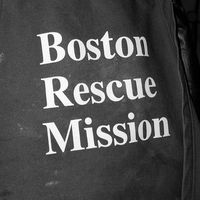About Boston Rescue Mission OP Counseling
Residential Recovery ProgramSubstance abuse is clearly one of the leading causes of homelessness and must be addressed in any prevention strategy.
Unfortunately, recovery for individuals with limited financial means usually consists of a three to five day detoxification program provided by publicly funded insurance and a return to their typically unstable pre-detoxification living situation.
This "recovery" is clearly inadequate, and many of these individuals soon revert to substance abuse and again put themselves at risk of becoming homeless.
Each year, their recovery program provides hundreds of recovering alcoholics and addicts with a safe and therapeutic environment in which they can address their substance abuse issues and ultimately achieve a healthy, self-sufficient living situation.
The program begins when a program member is referred by a licensed detoxification program.
The referred program member is assigned to an individual case manager who conducts a careful and extensive evaluation to assess the program member's mental health and vocational, legal, cognitive behavioral, housing, medical, family, recovery, educational, and other needs.
The case manager then develops an individualized care plan for the program member that is implemented through daily twelve step meetings.
Over the course of the program, case managers and training sessions provide program members with substance abuse treatment, mental health services, anger management treatment, employment assistance, job training, housing assistance, and financial management assistance.
In addition, program members participate in classes on living independently, repairing broken relationships, and improving social skills.
The goal of these sessions is to build program member self-esteem and equip them with the tools and skills they need to achieve permanent self-sufficiency.
All program services are provided without monetary commitment from program members.
This provides an opportunity to save money, including provisions for outstanding legal obligations.
Instead, program members are asked to participate in community service projects that contribute to the health and well-being of their treatment environment.
This provides a structured environment for each of their program members, which is an essential ingredient to the success of any recovery program.
When a program member is ready to embrace independent living with a community-based support network, graduates are provided with detailed discharge and aftercare planning.
Case managers track and monitor the program member's progress after discharge.
Formalized aftercare services are offered at Boston Rescue Mission as well as through informal relationships that have been formed through the treatment process.
Graduates are welcome to utilize the Boston Rescue Mission for vocational training, employment assistance, housing assistance, or any other services on their journey to establish an independent and supportive housing environment.
Sober Living ProgramThis fall, the Boston Rescue Mission launched an exciting new opportunity to support downtown Bostons community of recovering alcoholics and addictsthe Sober Living program.
Adult men with 30 days of sobriety can complete a short screening procedure to determine eligibility and enter the Kingston House as a member of a sober community.
Like other sober communities, members abide by certain house rules to ensure safety and sobriety and pay a nominal weekly fee as a commitment to the program and to support the cost of their living space.
But a few things distinguish the Missions Sober Living program from other sober communities:
1. A centrally located and convenient downtown location is a huge plus for many program members, who can find and access places of employment and transportation options easily.
2. Members fees include all meals. Because the Mission serves so many people each day, its easy to include Sober Living members, and it saves a lot of money for members.
3. Members have access to in-house group recovery meetings, case managers, spiritual development and many other resources available to residential recovery program members.
Since many Sober Living members have recently graduated from a recovery program, these in-house resources are very attractive to potential members.
The Mission sees the Sober Living program as a natural extension of their residential recovery program to fill a critical need in the recovery community of downtown Boston.
They appreciate your prayers and support through the launch of this exciting program.
Is this treatment center really free?
Most of the listings on this website are free; however, we decided it would also be helpful for our visitors to see sliding scale treatment centers (which are based on your income and you can qualify for free treatment) and low cost rehab centers for low income persons.


Tips on Choosing a Free Rehab Center in Boston, MA
Here are some additional tips:
- Ask about the center's admission process. What documentation do you need to provide? Is there a waiting list?
- Find out what the center's policies are on insurance and financial assistance. Will the center accept your insurance? Does the center offer financial assistance to patients who need it?
- Visit the center in person, if possible. This will give you a chance to meet the staff, see the facilities, and get a feel for the center's atmosphere.
- Talk to people who have been to the center. Ask them about their experiences and whether they would recommend the center to others.
Choosing a rehab center is an important decision. By following these tips, you can find a free rehab center in Boston, MA that is right for you.